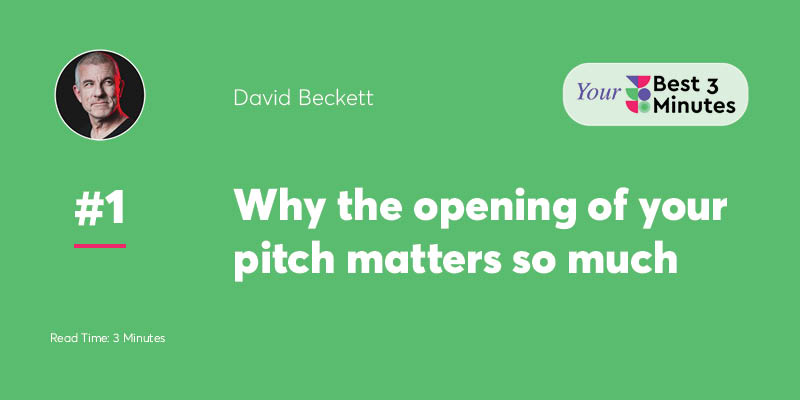
Prefer audio? Listen to David reading this post here – or listen to all posts on Spotify. ![]()
Not yet subscribed?
Join 25,000+ entrepreneurs and professionals. Get exclusive tips and tools to help you raise money and get buy-in for your ideas.
Why the opening of your pitch matters so much
When anyone starts listening to a pitch, they have two questions on their mind.
#1. Is this person professional?
#2. Do I want or need to know more?
Let’s face it: everyone’s busy!
Pretty much everyone feels full right now. Full of stuff to do: stuffed with information.
We guard our time ferociously, and allocate it based on value for us. The decision making about whether we invest time is done in seconds, and this is never more brutal than when listening to a pitch.
If the audience aren’t hooked in the first seconds, the phone comes out, email or TikTok are opened up, and we do something productive or fun.
So when pitching, how do we hook the audience to invest their time? Simple: make sure we answer the two questions on their mind.
#1. “Is this person pitching this idea professional?”
If a founder starts their pitch with a classic Ramble, the audience gets the message: this person is not prepared.
The Ramble sounds like this.
‘Well, erm… so… it’s our turn now, I guess, so… well, thanks to everyone for coming, and, erm, thanks to the organisers for creating such a great platform to share all our work, because…’
The message that reaches the audience’s brain is:
“This person hasn’t prepared. It’s going to be a chaotic pitch. This will not be a useful investment of my time. Let’s do something else…’
Phone out, email or influencer video engaged.
You can do it differently.
Have a plan from the first word, the first sentence. Test out the opening in advance, and get those first 5-6 sentences rock solid. Say it out loud for yourself: ask for feedback and refine the story.
If you start with a clear plan and get straight into the pitch, the message the audience receives is:
‘Oh, this seems professional, They’ve taken my time as a listener seriously. There might be something of value for me: better listen up!’
That clear thought out plan gets you off to great start, and is the platform for the rest of the pitch.
#2. “Do I want to need to know more?”
We’re constantly assessing the value of inputs. If they look familiar, or not relevant for us, we switch off or switch tasks.
As a pitcher, it helps to find a way to trigger curiosity. You can do this by raising a question:
‘How long do you think it takes 100 million drivers every day to park in big cities across Europe?’
You can also do it by giving a surprising angle on a familiar topic.
‘You already know that C02 emissions are bad. But we’re here today to talk about cutting a greenhouse gas that’s 23,000 times more damaging than CO2: and its usage is doubling every year.’
If you’re pitching to investors, the big thing they are looking for is an opportunity: a huge unsolved problem, and a team that has made progress towards solving it for customers.
That means you might begin with the size of the problem.
‘100 million drivers’; ‘A billion tonnes of waste garments’; ‘10,000 Accountancy firms lose 100 Million euros every week because…’
And follow quickly with how much time you save with your product; how many drivers; how much waste material you’ve reduced; and how much cost you’ve cut for how many Accountancy firms.
#Bonus benefit of getting the opening right.
Getting the pitch right in the first 30-60 seconds will help you get control of any nerves you’re feeling.
The opening is the moment of maximum stress. If you define and test out what you’re going to say in advance, you’ll be guaranteed success in that first minute.
Successful delivery of a strong opening reduces your stress levels. Your temperature drops, your muscles relax, and your mind engages.
Good luck with the opening of your pitch – see you next week!
Subscribe to the Newsletter
Join 25,000+ entrepreneurs and professionals. Get exclusive tips and tools to help you raise money and get buy-in for your ideas.

